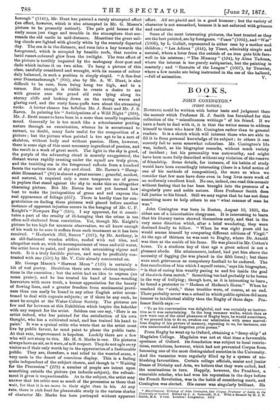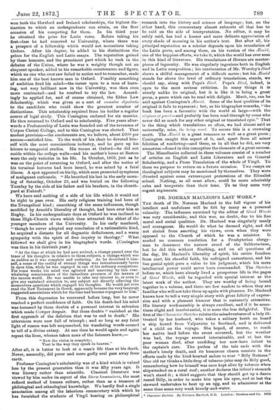BOOKS.
JOHN CONINGTON.* [FIRST NOTICE.]
NOTHING could be written with better taste and judgment than)
the memoir which Professor H. J. Smith has furnished for this collection of the "miscellaneous writings" of his friend. If we have a fault to find with it, it is that the writer seems to address
himself to those who knew Mr. Conington rather than to general readers. It is a sketch which will interest those who are able to fill it in from personal knowledge of its subject ; to others it can scarcely fail to seem somewhat colourless. Mr. Conington's life was, indeed, as his biographer remarks, without much variety of incident ; but his personality was noteworthy, and might. have been more fully described without any violation of the reserve
of friendship. Some details, for instance, of his habits of study would have been exceedingly interesting (there is a brief notice of one of his methods of composition), the more so when we. consider that few men have done even in long lives more work of an uniformly excellent kind. No one, indeed, can read this memoir
without feeling that he has been brought into the presence of a. singularly pure and noble nature. Here Professor Smith does full justice to his friend. Still we may regret that he has not done something more to help others to see "what manner of man he.
was."
John Conington was born in Boston, August 10, 1825, the eldest son of a Lincolnshire clergyman. It is interesting to learn that his literary tastes showed themselves early, and that in the very same direction which, after a brief wandering, they were destined finally to follow. "When he was eight years old he. would amuse himself by comparing different editions of Virgil."
At the age of thirteen he was sent to Rugby, where Dr. Arnold was then at the zenith of his fame. He was placed in Mr. Cotton's house. To a studious boy of that age a great school is not a pleasant abode. His attainments, indeed, had put him above the necessity of fagging (he was placed in the fifth form) ; but there were such grievances as compulsory football to be endured. The first recollection of him which I myself retain," says his biographer„ "is that of seeing him wearily pacing to and fro inside the goal of the sixth-form match." Something too had probably to be borne in the way of bullying ; though here, as it is interesting to learn, he found a protector in "Hodson of Hodson's Horse." When he reached the "sixth," these troubles were, of course, at an end. There probably never was a school in which public opinion did more honour to intellectual ability than the Rugby of those days. Pro- fessor Smith says
To us his conversation was delightful, and was certainly as instruc- tive as it was entertaining. In the long summer walks, which then as now wore one of the chief pleasures of Rugby boys, he would sometimes, if we pressed him to do so, awaken our admiration with some marvel- bus display of his powers of memory, repeating to us, for instance, our own unsuccessful and forgotten prize poems."
From Rugby he went up to Oxford, obtaining a "demy-ship " at Magdalen College. Magdalen was not at that time a favourable specimen of Oxford. Its foundation was subject to local restric- tions, restrictions, however, which had not prevented Corpus from.
becoming one of the most distinguished societies in the University..
And the vacancies were regularly filled up by a system of un- blushing favouritism. Certain college officials, senior and junior Deans of Divinity and Arts, we believe that they were called, had. the nominations in turn. Happily, however, the President, a, venerable scholar, who had won his reputation in the days before the French Revolution, was in the habit of considering merit, and Conington was elected. His career was singularly brilliant. He
* Miscellaneous Writings of John Coninglon, late Corpus Protestor of Latin in ths L•nirersity of Oxford. Edited by J. A. Symonds, MA. With a Memoir by H. .1. S. Smith, M.A. 2 vols. London: Lougmans. 1572
won both the Hertford and Ireland scholarships, the highest dis- tinction to which an undergraduate can attain, on the first occasion of his competing for them. In his third year he obtained the prize for Latin verse. Before taking his
first-class he had removed to University, where there was a prospect of a fellowship which would not necessitate taking Orders. After his degree, he added to his distinctions the prizes for the English and Latin essays. The reputation gained
by these honours, and the prominent part which he took in the debates of the Union, where he was a weighty though not an eloquent speaker, added to his remarkable countenance and figure, which no one who ever saw failed to notice and to remember, made
him one of the best known men in Oxford. Possibly something of ambition fired his mind—the career open to a man of learn- ing, not very brilliant now in the University, was then even
more contracted—and he resolved to try the law. Accord- ingly he applied for, and of course obtained, the Eldon Law Scholarship, which was given as a sort of cumulus dignitatis to the candidate who could show the greatest number of distinctions. This scholarship required from its holder a regular course of legal study. This Conington endured for six months. He then returned to Oxford and to scholarship. Five years after- wards a Professorship of Latin was founded out of the revenues of Corpus Christi College, and to this Conington was elected. That modest provision—the emoluments are, we believe, about 1600 per annum—satisfied him. To the work of his chair he devoted him- self with the most conscientious industry, and he gave up his leisure to congenial studies. His rooms at Oxford—he did not reside within the college walls—and his mother's home at Boston were the only varieties in his life. In October, 1869, just as he was on the point of returning to Oxford, and after the notice of his terminal lectures had been issued, he was seized by a fatal
illness. A spot appeared on his lip, which soon presented symptoms of malignant carbuncle. "He breathed his last in the early morn- ing of Saturday, October 23, and was buried on the following
Tuesday by the side of his father and his brothers, in the church- yard at Fishtoft."
We have said nothing of a side of his life which it would not
be right to pass over. His early religious training had been of the Evangelical kind ; something of the same influences, though modified by Arnold's liberality of thought, had been over him at Rugby. In his undergraduate days at Oxford he was inclined to those High-Church views which then attracted the ablest of the younger members of the University. In his early manhood, "though he never adopted any conclusion of a rationalistic kind, he acquired a distaste for all dogmatic definiteness, and a warm sympathy with the spirit of free inquiry in theology." What followed we shall give in his biographer's words. (Conington was then in his thirtieth year.)
"At the time at which he had now arrived, a change passed over the tenor of his thoughts in relation to these subjects, a change which was as sudden as it was complete and enduring. As he described it him- self, a sense of the reality of eternal things was instantaneously borne in upon him, while he was engaged in one of his ordinary occupations. For some weeks his mind was agitated and unstrung by this over- whelming consciousness of the immediate presence of the terrors of the unseen world. He was unable to take any interest in, or even to give any sustained attention to, any subject not directly affecting the momentous questions which engaged his thoughts. He would not even read the New Testament in Greek, apparently because the very language suggested associations which for the time had become repugnant to him."
From this depression he recovered before long, but he never reached a perfect confidence of faith. On his death-bed his mind was harassed by those doubts of a personal interest in salvation which made Cowper despair. But these doubts "vanished at the first approach of the delirium that was to end in death." His utterances were now full of triumph ; and so long as any faint light of reason was left unquenched, his wandering words seemed to tell of a divine extasy. At one time he would again and again repeat the lines, whence taken none of the listeners knew,—
" Now the vision is complete ;
That is the way they speak in heaven."
After all, it is better to look at a man's life than at his death. Never, assuredly, did purer and more godly soul pass away from earth.
Professor Conington's scholarship was of a kind which is valued less by the present generation than it was fifty years ago. It was literary rather than scientific. Classical literature was viewed by him under its aspect of the liter se humaniores, the most refined method of human culture, rather than as a treasure of philological and ethnological knowledge. We hardly find a single annotation among all the laborious commentary with which he has furnished the students of Virgil bearing on philosophical
research into the history and science of language ; but, on the other hand, this commentary almost exhausts all that has to be said on the side of interpretation. No editor, it may be safely said, has had a keener and more delicate appreciation of every shade of meaning in his author's text. But after all, his principal reputation as a scholar depends upon his translation of the Latin poets, and among these, on his version of the iEneid, one of the happiest efforts, we take it, which the world has ever seen in this kind of literature. His translations of Horace are master- pieces of ingenuity. He was singularly ingenious both in English and in Latin composition ; his continuation of Mr. Worsley's lliad shows a skilful management of a difficult metre ; but his "Eneid stands far above the level of ordinary translations, stands, we should say, along with Pope's Iliad. Pope's Iliad, indeed, is open to the most serious criticism. In many things it is utterly unlike its original, but it is like it in being a great poem, a poem which can be read with delight. Much, too, can be said against Conington's "End& Some of the best qualities of its original it fails to represent ; but, as his biographer remarks, "the book has been a favourite with the world at large—with the virgines et pueri —andprobably has been read through by some who never did as much for any other original or translated epic." That is the thing which translations so often, we had almost said so universally, miss, the being read. To secure this is a crowning merit. The Eneid is a great romance as well as a great poem ; Conington caught this aspect of it, and, apart from all minor felicities of rendering—and these, as in all that he did, are very numerous—found in this conception the elements of a great success.
The Miscellanies collected in these volumes consist of a number of articles on English and Latin Literature and on General Scholarship, and a Prose Translation of the whole of Virgil. To these we purpose to return on a future occasion. Two essays on theological subjects may be mentioned by themselves. They were directed against some extravagant pretensions of the Ritualist school. Nothing, as all must allow, could be more admirably calm and temperate than their tone. To us they seem very cogent arguments.



































 Previous page
Previous page